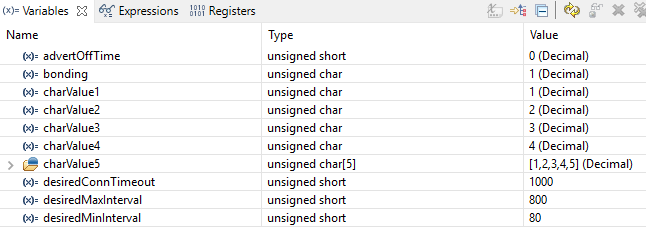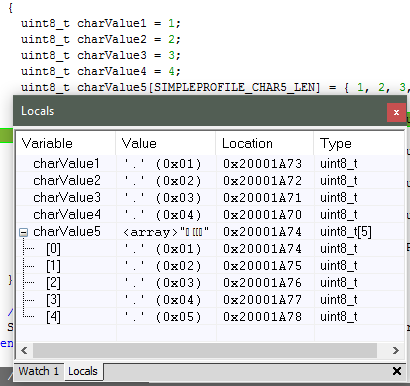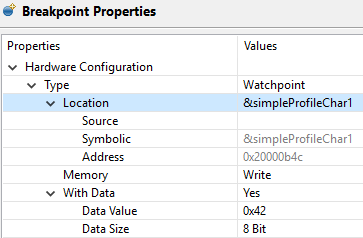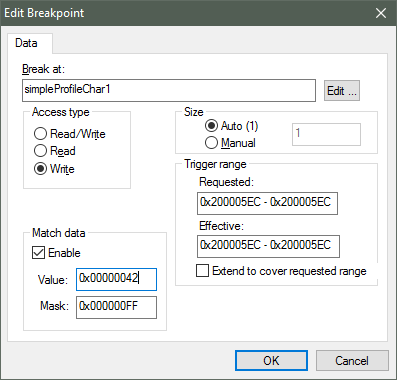Watching Variables and Registers¶
IAR and CCS provide several ways of viewing the state of a halted program. Global variables are statically placed during link-time and can end up anywhere in the RAM available to the project or potentially in flash if they are declared as a constant value. These variables can be accessed at any time through the Watch and Expression windows.
Unless removed due to optimizations, global variables are always available in these views. Local variables or variables that are only valid inside a limited scope are placed on the stack of the active task. Such variables can also be viewed with the Watch or Expression views, but can also be automatically displayed when breaking or stepping through code. To view the variables through IAR and CCS, do as follows.
Variables in CCS¶
You can view Global Variables by doing either of the following.
- Select View –> Expressions
- Select a variable name in code.
- Right-click and select Add Watch Expression.

Figure 108. Variable watch window. Note that you can cast values, get address and sizeof, etc.
- Select View –> Variables to
auto-variablesthat are present at the current location when stepping through code.

Figure 109. Local variables. This screenshot is taken during execution of the Simple Peripheral init function.
Variables in IAR¶
To view Global Variables, do either of the following.
- Right-click on the variable.
- Select Add to Watch: varName.
- Select View –> Watch n
- Enter the name of the variable.

Figure 110. Variable watch window. Note that you can cast values, get address and sizeof, etc.
View –> Locals show the local variables in IAR.

Figure 111. Local variables. This screenshot is taken during execution of the Simple Peripheral init function.
Considerations When Viewing Variables¶
Local variables are often placed in CPU registers and not on the stack. These variables also have a limited lifetime even within the scope in which they are valid, depending on the optimization performed. Both CCS and IAR may struggle to show a particular variable due to its limited lifetime. The solution when debugging is as follows.
- Move the variable to global scope, so it remains accessible in RAM.
- Make the variable volatile, so the compiler doesn’t place the value in a register.
- Make a shadow copy of the variable that is global and volatile.
IAR may remove the variable during optimization and inline the usage of the
value. If so, add the __root directive in front.
Memory Watchpoints¶
As mentioned in Debug Interfaces, the DWT module contains four memory watchpoints that allow breakpoints on memory access. The hardware match functionality looks only at the address. If intended for use on a variable, the variable must be global. Using watchpoints is described for IAR and CCS as follows.
Note
If a data watchpoint with value match is used, two of the four watchpoints are used.
Watchpoints in CCS¶
- Right-click on a global variable.
- Select Breakpoint –> Hardware Watchpoint
- Go to the list of breakpoints (View –> Breakpoints)
- Right-click and edit the Breakpoint Properties to configure the watchpoint.

Figure 112. Adding a watchpoint on a variable.
This example configuration ensures that if 0x42 is written to the memory location for Characteristic 1 in the Bluetooth low energy simple_peripheral example project the device halts execution.

Figure 113. Configuring a hardware watchpoint to break on 8-bit write with value 0x42.
Watchpoints in IAR¶
- Right-click a variable (global).
- Select
Set Data Breakpoint for 'myVar'to add it to the active breakpoints. - Go to the list of breakpoints (View –> Breakpoints)
- Choose Edit... to set up whether the watchpoint should match on read, write, or any access.

Figure 114. Configuring a hardware watchpoint to break on 8-bit write with value 0x42.